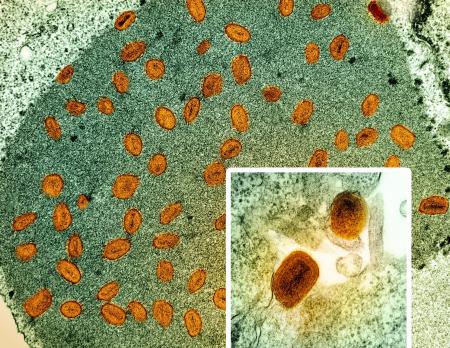
On Aug. 14, the World Health Organization determined that the recent surge in cases of mpox, formerly known as monkeypox, in the Democratic Republic of the Congo and surrounding countries constituted a public health emergency of international concern. While mpox is endemic to the DRC, meaning it is regularly occurring, this outbreak is significant because of the sheer number of infections.
Mpox is an Orthopoxvirus, a genus of viruses that includes smallpox and cowpox. The disease causes rash, mucosal lesions, muscle aches, back pain and swollen lymph nodes, but is rarely fatal.
Mpox is divided into two clades, which are closely related groups of viruses. The more famous clade is clade II, which caused a global outbreak in 2022. The 2022 outbreak spread outside areas where the virus is endemic and primarily affected men who have sex with men. The DRC outbreak appears to have been caused by the emergence of a new strain, clade Ib. Clade I is generally more infectious and causes more severe symptoms than clade II.
Cases of clade Ib mpox have not been reported in the United States, but cases have been reported in 13 African countries, and an isolated case has been reported in Sweden. 66% of cases and 83% of deaths have been reported in children under the age of 15. Most of these cases appear to have been acquired through household infections, with sexual or zoonotic contact accounting for non-household infections.
It is unlikely that mpox will cause an outbreak spreading through children in the United States, but it still possibly poses risks to adults. Like in the 2022 outbreak, clade Ib is capable of being spread through sexual contact and poses many of the same risks as clade II did.
Clade II smallpox circulated in Louisiana during the 2022 outbreak, infecting a total of 329 people in Louisiana. Only four cases have been reported within the state in the past year and the 2022 outbreak is considered over. Louisiana has high rates of other sexually transmitted infections. In 2022, Louisiana had the highest rate of chlamydia and the third-highest rate of gonorrhea in the country. The high rates of STIs mean that New Orleans and Louisiana as a whole would be more at risk from a new strain of mpox.
While clade II is currently circulating at low levels in the U.S. and clade Ib has yet to be detected here, it is still important to take precautions. Lina Moses, an associate professor of epidemiology who works with zoonotic disease, including mpox, said, “Check yourself, check your partners. Know the people that you’re having intimate contact with.” Condom use does not prevent the spread of mpox, as it spreads through infected lesions rather than bodily fluids.
Additionally, a vaccine is available to at-risk populations. The JYNNEOS vaccine is effective against both smallpox and mpox and is recommended for at-risk populations. The Centers for Disease Control and Prevention recommends vaccinations for men who have sex with men and have a recent diagnosis of a sexually transmitted infection or more than one sexual partner. The closest location offering mpox vaccines to the uptown campus is LCMC Health University Health Center, located Downtown.
As mpox continues to spread globally and concerns rise, Moses recommends “not to be hysterical about emerging pathogens [and] really understanding your risk, rather than relying on stereotypes and over-sensationalization of how things are spread.”


